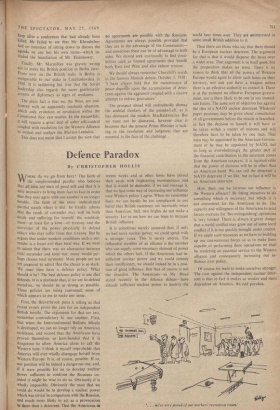Defence Paradox
By CHRISTOPHER HOLLIS
WHERE do we go from here? The faith of the simple-minded pacifist who believes that all men are men of good will and that it is only necessary to bring them face to face in order that they may agree with one another is no longer tenable. The faith of the more sophisticated pacifist stands where it did: he frankly admits that the result of surrender may well be both death and suffering for himself, the establish- ment—at least for a time--of tyranny and the surrender of the power physically to defend others who may suffer from that tyranny. But he argues that under modern conditions such a sur- render is a lesser evil than total war. If we were to admit that there was no alternative between total surrender and total war, many would per- haps choose total surrender. Most people are not Yet prepared to admit that the choice is so stark. We must then have a defence policy. What should it be? The best defence policy is one that defends. It is a platitude that, if we are to defend ourselves, we should be as strong as possible. Three policies are being canvassed, none of which appears to me to make any sense.
First, the Beaverbrook press is telling us that recent events prove the case for an independent British missile. The arguments for that are two, somewhat contradictory to one another. First, that when the Intercontinental Ballistic Missile Is developed, we can no longer rely on American assistance, and second that the Americans have proved themselves so ham-handed that it is dangerous to allow America alone to call the Western tune. I think it myself improbable that America will ever wholly disengage herself from Western Europe. It is, of course, possible. If so, our position will be indeed a dangerous one, and, if it were possible for us to develop nuclear Power sufficient to confront the Russians un- aided it might be wise to do so. Obviously it is wholly impossible. Obviously the most that we could do would be to develop a nuclear power Which was trivial in comparison with the Russian, and much more likely to act as a provocation to them than a deterrent. That the Americana no recent weeks and at other times have played their cards with frightening incompetence and that it would be desirable, if we can manage it, that we Fuld some way of increasing our influence over Western policy I agree. When we remember Suez, we can hardly be too complacent in our belief that British statesmen are inevitably wiser than American. Still, two frights do not make a security. Let us see how we can hope to increase British influence.
It is sometimes merely assumed that, if only we had more nuclear power, we could speak with a stronger voice. This is surely untrue. The influential member of an alliance is the member who can supply some necessary element of power which the others lack. If the Americans had in- *sufficient nuclear power and we could remedy their insufficiency, we should indeed be in a posi- tion of great influence. But that of course is not the situation. The Americans—as Mr. Head stated recently in the defence debate—have already sufficient nuclear power to destroy the world four times over. They are uninterested in some small British addition to it.
Then there are those who say that there should be a European nuclear deterrent. The argument for that is that it would disperse the bases over a wider area. That argument is in itself good, but the proposition makes no sense. There is no reason to think that all the powers of Western Europe would agree to allow such bases on their territory, nor can you have a weapon unless there is an effective authority to control it. There is at the moment no effective European govern- ment, nor is there likely to be one in any immed- iate future. The same sort of objection lies against the idea of a NATO nuclear deterrent. Whatever paper promises may be given about consultation of all governments before the missile is launched, in fact the decision to launch it will have to be taken within a matter of minutes and will therefore have to be taken by one man. That man may be appointed by the American Govern- ment or he may be appointed by NATO, but so long as overwhelmingly the greater part of the financial contribution to the deterrent comes from the American taxpayer, it is inconceivable that the power of decision will be in other than an American hand. We can call the deterrent a NATO deterrent if we like, but in fact it will be an American deterrent.
How, then, can we increase our influence in the Western alliance? By fitting ourselves to do something which is necessary but which it is not convenient for the Americans to do. The capacity and willingness of the Americans to send forces overseas for 'fire-extinguishing' operations is very limited. There. is always a grave danger that a world conflict may grow out of some local conflict if it is not quickly brought under control. If we apply such resources as we have to' building up our conventional forces so as to make them capable of performing these operations we shall be rendering an essential service to the Western alliance and consequently increasing our in- fluence over policy.
Of course we want to make ourselves stronger. The case against the independent nuclear deter- rent is that in fact it makes us weaker and more dependent on America. An odd paradox.






































 Previous page
Previous page